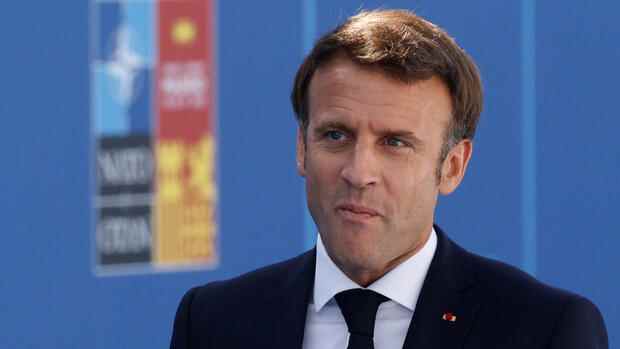The French President’s appeals for cross-party cooperation have not borne fruit.
(Photo: Reuters)
Paris For a week, Emmanuel Macron floated away from the domestic political problems that have plagued him since losing his government majority in Parliament: The French President traveled to the European Council in Brussels, met his G7 colleagues in Elmau and attended NATO and UN summits. Meanwhile, in Paris, he had his Prime Minister Elisabeth Borne explore the opposition’s willingness to cooperate.
After his return from the world stage, the complicated situation for Macron at home has not changed: there is no stable support for his policies in the National Assembly in sight. The new government team that Macron presented on Monday is still based solely on his center alliance – which has been missing around 40 seats for an absolute majority since the parliamentary elections in June. At the first meeting of the restructured cabinet, Macron said: “It is appropriate to note the unwillingness of the parties to participate in an intergovernmental agreement.”
A week of truth has begun for the President. The reshuffle of the government without representatives from the opposition shows that his appeals for cross-party cooperation have not borne fruit. On Wednesday, Prime Minister Borne will make a government statement outlining the political priorities in the National Assembly.
Planned purchasing power law as the first major test
The first major test of the government’s ability to act is likely to be the planned purchasing power law, with which Macron wants to alleviate the consequences of inflation for the French. His Prime Minister’s appearance before MPs will also provide clues as to whether the President is sticking to the goal of major pension reform.
Top jobs of the day
Find the best jobs now and
be notified by email.
Traditionally, the government statement is followed by a vote of confidence in Parliament. In view of the lack of a majority, however, it was questionable whether Borne would take this risk – because the vote of confidence is not mandatory. Borne may then be confronted directly with a motion of no confidence. The camp of left-wing populist Jean-Luc Mélenchon had announced this step.
Macron was repeatedly asked about his majority problem during trips abroad. He then let his compatriots know from afar that the situation in France was actually “terribly banal” from a European point of view. “Some coalition governments have up to five, six or seven partners.” Only: coalitions are not actually planned in the French political system. And the political competition’s willingness to work with Macron is limited.
The president himself had ruled out cooperation with Mélenchon’s Indomitable France party, as well as cooperation with Marine Le Pen’s right-wing national Rassemblement National. Instead, he courted the conservative-bourgeois Republicans and tried to separate the socialists and greens from their alliance with Mélenchon. However, they refuse to join Macron’s government and are at best open to negotiating parliamentary support for certain legislative projects with the president’s center alliance.
The government reshuffle expected after the defeat in the parliamentary elections offered no surprises. The heavyweights of the cabinet remain in office, including Economy and Finance Minister Bruno Le Maire and Interior Minister Gérald Darmanin. Catherine Colonna continues to head the external department.
Unchanged number of ministers
An important person from a German perspective is the new Europe Minister Laurence Boone, most recently chief economist at the Organization for Economic Cooperation and Development (OECD) and former economic adviser to Macron’s predecessor François Hollande. The previous Europe Minister, Clément Beaune, who organized the French EU Council Presidency behind the scenes for Macron over the past six months, will take over the transport department in the new government.
After his re-election as president in April, Macron had actually announced a leaner government that would focus on core tasks. With the reorganization, however, it now includes practically the same number of ministers, deputy ministers and state secretaries as before. Some new appointments had become necessary because several ministers had not won their constituencies.
The Élysée Palace had stipulated that members of the government would have to vacate their cabinet posts if they failed in the general election. The Minister for Solidarity, Autonomy and the Disabled, Damien Abad, also had to resign. Allegations of rape were made against Abad, which he denies.
More: Macron in search of the lost majority

